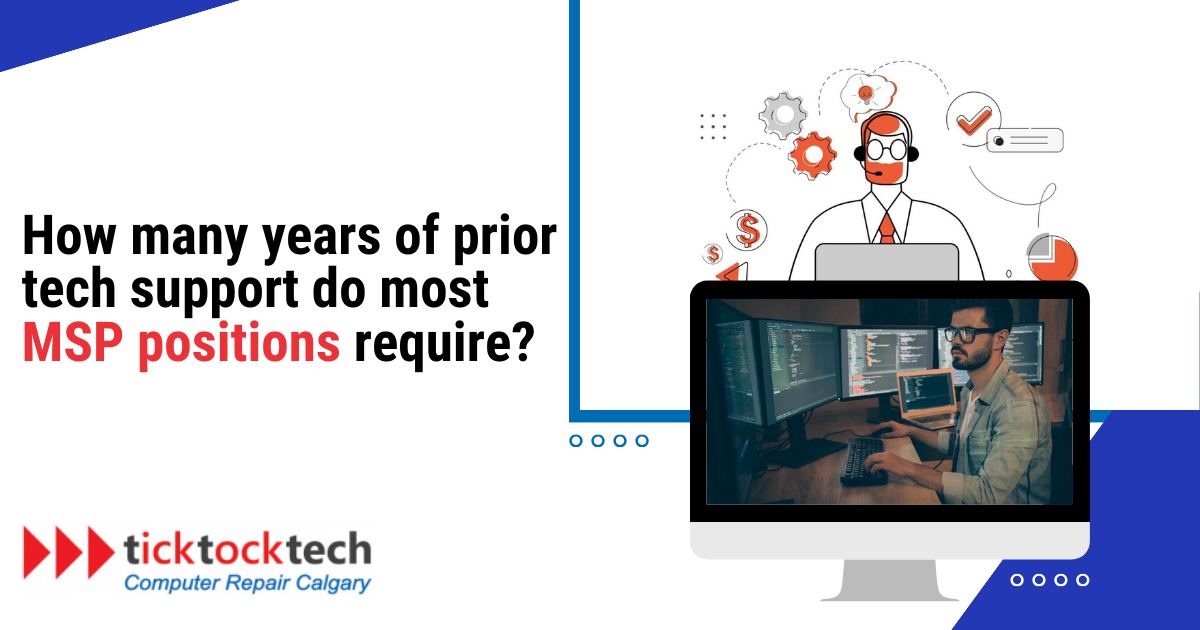Remote tech support has been on the rise, and more businesses are going for it. These remote tech support services are mostly offered as a Managed service. A managed service provider (MSP) is a third-party business that remotely administers an organization’s end-user systems and information technology (IT) infrastructure. Businesses use MSPs to handle a certain range of routine administrative tasks. These services might involve security, monitoring, and administration of networks and infrastructure. Depending on the specific sector, MSP covers a variety of tech components support. A managed IT support provider, for example, assists the business with maintaining and providing for its networking and IT infrastructure. MSP typically operate remotely over the Internet, particularly when handling the networks and security of client businesses.
MSPs can be reliable, well-run businesses as well as lone people. In the network, application, infrastructure, and security domains, these businesses mostly concentrate on cloud-based solutions. A team of knowledgeable tech support specialists will be needed for MSP position. We’ll look at the experience requirements in this post for managed service providers that are hiring.
How do Managed Service Providers (MSP) work
firms that oversee IT services for other firms are known as managed service providers. For businesses that lack an IT staff or that want additional support for their current IT operations, managed service providers (MSPs) essentially serve as the company’s external IT department.
The operation of MSPs is quite simple. They offer a variety of services, such as network, application, infrastructure, and security services, via active management and continuous and regular support on customers’ property, in the hosting data center of their MSP, or a data center owned by a third party.
Managed Service Providers (MSPs) provide a range of service alternatives since they customize their solutions to match the various demands of various enterprises.
In terms of tech support fix services, MSP intervene to resolve issues remotely or, similar to in-home repair services, by dispatching personnel to an organization’s location. This method is all about identifying the source of a problem and immediately resolving it. Companies cover the cost of any new components that may be required to get everything back up and running, in addition to the time the MSP spends diagnosing and resolving the issue.
The majority of MSPs offer subscription-based services to maintain a business’s network’s constant functionality. Here, continuous service is provided to host firms for a monthly price. In essence, managed security services serve as a consistent service to prevent breaches in an organization’s cyber security. The best part about this situation is that in the event of a problem, the MSP takes immediate action to fix it at no additional expense to the business. The amount of PCs or other pieces of equipment that are being covered often determines how much this kind of service will cost.
What Does Managed Service Providers Do
Managed Service Providers provide a wide range of services, with an emphasis on managing and resolving all aspects of a company’s IT operations. Their key responsibilities include network monitoring, infrastructure management, cybersecurity solutions, cloud services, and software support. Managed Service Providers also handle a variety of activities, including technical support, cybersecurity, payroll, and compliance management. They allow businesses to focus on their main operations while knowing that their IT requirements are in capable hands.
Software and Hardware Support
Managed Service Providers (MSPs) keep your computer equipment and applications in top shape. They take care of upgrades, upkeep, and solving any issues for both software and hardware, which helps your business run smoothly.
Technical Support to Staff
If technology acts up, MSPs are ready to step in with prompt help. They provide technical support to your team, fixing issues fast to cut down on interruptions and maintain high productivity levels.
Cybersecurity
Tight security is a must in today’s world. MSPs bolster your business’s defenses against cyber threats. They keep an eye on your networks, set up security software, and teach your team how to keep important information safe from online attackers.
 Manage Payroll Services
Manage Payroll Services
It might be unexpected, but some MSPs also handle payroll tasks. Through platforms like Phoenix, they smooth out the process of paying employees. They make sure everyone gets their salary correctly and punctually, all while handling tricky tax laws.
Manage User Access Accounts
Keeping track of who can access certain information in your company is crucial. MSPs oversee user accounts to ensure people have the right access to their jobs without risking the company’s security.
Cloud Services
The cloud offers advantages like flexibility, the ability to scale, and savings. MSPs guide businesses in using the cloud effectively by providing services such as moving to the cloud, maintaining it, and improving the use of cloud resources tailored to the business’s needs. Tech support MSP
Offer Compliance and Risk Management
MSPs keep your business up-to-date with current regulations and standards. They’re on top of managing risks, which shields your business from legal or financial issues that could arise.
How do you become a Managed Service Provider?
There are several phases involved in becoming a Managed Service Provider, the first of which is acquiring the required expertise in providing technical assistance. Listed below are some instructions:
Get Hands-on IT Service Experience: If you want to manage IT services for customers, you need real-world experience first. This could mean working in IT support or a similar field. Try to get at least two to three years of work under your belt to understand different parts of IT. Start at the bottom in tech support by handling basic jobs and learning about both software and hardware.\
Build a Variety of IT Skills: It’s good for managed service providers (MSPs) to know about data management, cloud services, cybersecurity, and how to run networks because they have to do lots of different IT jobs. You could also specialize in one area. Most MSPs have teams with experts in various fields because they work together on projects.
Know How Businesses Work: MSPs need to understand everything about the business, including how to price things, take care of customers, and make contracts. Besides tech knowledge, you’ll need to know about business to work with an MSP.
 : You might consider getting certified for MSP jobs, like with CompTIA Network+, Security+, CISSP, or Microsoft Certified: Azure Administrator Associate, and other vendor-specific credentials (Microsoft, Cisco, etc.). These certifications prove you know your stuff to employers.
: You might consider getting certified for MSP jobs, like with CompTIA Network+, Security+, CISSP, or Microsoft Certified: Azure Administrator Associate, and other vendor-specific credentials (Microsoft, Cisco, etc.). These certifications prove you know your stuff to employers.
Begin Small and Expand: Start by working with new or small businesses. As you get more clients and experience, you can offer more services. Since technology is always changing, staying up-to-date with the latest trends and tech is key to giving clients what they need.
How many years of Prior Tech Support do Most MSP Positions Require?
A minimum of one year and a maximum of five years of relevant experience in technical support is usually required for MSP (Managed Service Provider) roles. Candidates with 1-2 years of experience may be considered for entry-level employment, whilst those with 3-5 years of experience are typically sought after for more senior posts.
Entry-Level Offers: Even roles like help desk and junior tech assistance may require only one or two years of expertise. These jobs give an overview of various IT challenges and solutions.
Mid-Level Positions: Terms such as “network administrator,” “IT consultant,” or “cybersecurity analyst” require three to five years of relevant expertise. These roles require a more in-depth understanding of how IT infrastructure is built, as well as the capacity to tackle more complicated challenges.
Senior-Level Skills: Typically, high-level roles in strategic planning, IT network architecture, or leading big tech groups require at least 5 years of experience. For these types of employment, not only technical abilities are required, but also leadership and business knowledge.
Take Away
Managed Service Providers (MSPs) serve as the backbone for businesses looking to streamline their IT operations. With a focus on network monitoring, cybersecurity, cloud services, and more, MSPs require a diverse skill set from their technicians. For those aspiring to join this dynamic field, gaining 1-5 years of tech support experience is essential, with specific roles dictating the exact requirements. This hands-on experience lays the foundation for a successful career in managing and protecting the digital infrastructure of businesses across various sectors.
FAQs
Who Are the Biggest MSPs in 2024?
While individual firm rankings can change, key players frequently include those with a diverse service offering, a global presence, and a strong focus on cybersecurity, cloud services, and automation. Companies such as IBM, Microsoft, and Amazon Web Services frequently score high owing to their diverse portfolios and innovation in IT services.
How Important Are MSPs in 2024?
MSPs are more important than ever, especially as organizations rely on digital infrastructures, remote work becomes more common, and cybersecurity threats increase. MSPs not only help businesses manage their IT needs effectively, but they also enable them to adapt to new technologies and guard against digital threats.
How will MSPs make money in 2024?
MSPs often earn money through a subscription-based model, charging clients a set monthly charge for continuous services. This strategy provides MSPs with regular income as well as cost-effective IT management for clients. MSPs may also provide tiered service levels, project-based pricing for specific installs or upgrades, and consulting services for IT strategy and optimization.


 Manage Payroll Services
Manage Payroll Services